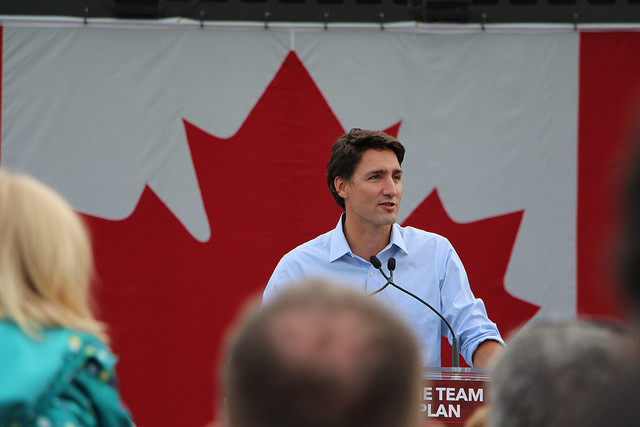A speech Justin Trudeau gave in Vancouver last week was one of the most unusual ever from an elected official. Barack Obama’s 2008 speech on racism during his first campaign was also rare, and morally far loftier, but not nearly as quirky. This stands alone for quirk.
Trudeau told University of British Columbia students that he was supporting Stephen Harper’s hastily improvised, utterly unnecessary, reckless anti-terror bill because “I do not want this government making political hay out of an issue … as important as security.” He freely acknowledged that “This conversation might be different if we weren’t months from an election campaign,” in which case he’d presumably oppose the bill for the wretched blight it is. But “we know that, tactically, this government would be perfectly happy if the opposition completely voted against this bill because it fits into their fear narrative.”
So there it is. He’s letting voters in on his grotty tactics, not his high-minded principles. It’s precisely what politicians never do.
They leave that to analysts, columnists or panelists on Evan Solomon’s show. Trudeau is leaving them all high and dry. What are they going to exult in now, instead of their normal jaded reveals of the cynical calculations behind party declamations? When politicians analyze their own tactics, what remains for commentators? It would be like artists explaining what they’re “really trying to say,” instead of leaving that to critics. You could feel some befuddlement in the way that, for instance, Tom Walkom wrote that the speech “contradicts everything Trudeau claims to stand for… Even weirder is the fact that the Liberals admit the bill they plan to support is fundamentally flawed.”
Trudeau’s certainly right about Harper’s own tactical aims. Recently the PM said, “I know that the opposition thinks it is a terrible thing that we are standing up to the jihadists … they think it is a terrible thing that some of these jihadists got killed when they fired on the Canadian military” — though Harper would never admit it’s all merely election bait.
Should Trudeau just take it? Hand Harper a club to beat him with during the campaign? What’s his alternative? In an earlier try, he said he’d support the bill but amend it if he won power. But that’s still spin. In Vancouver he went all the way to honesty.
What’s odd is it lets him have it both ways: to say my real principles hate this bill but for tactical reasons, I’ll back it. How does Harper answer that — by dissecting it? It’s too complicated, so he basically ignores it. What about voters? They’re used to politicians claiming deep convictions. They know it all gets superseded by strategy but they’d rather not think so; they yearn for principle somewhere in the political morass. So will they too brush it aside?
What I find appealing, is how it relativizes the place of elections in politics. Elections aren’t the sum of politics and can’t ever be, because they’re always calculated exercises at a given point. You do the best you can with the choices available right then. If you want something absoluter, you’d better expand definitions and get active before and outside the voting system.
I also like the way it treats voters as adults by admitting what everyone knows is happening. How can we tell when Trudeau is talking true principles versus mere tactics? Maybe there should be a code word: it’s tactics when he says, The game’s afoot.
What would happen if Vancouver-talk became the new mode of political discourse? Harper: We don’t really need this bill but with us stuck in the polls and the economy no longer a strength, you don’t really expect me not to jump on the shootings as a way to scare hell out of voters, do you? Mulcair: How can I attack this squirt, Trudeau, while claiming my main target is still Harper? Damn, I miss Ignatieff.
But that’s not very likely, it’s too meta. You get the sense that Trudeau and his buds occasionally brainstorm about how far they can push things next, mostly for the hell of it. Everyone felt better this week when Justin attacked Stephen for divisiveness and all the players assumed their assigned positions. We were back in the ballpark.
This column was first published in the Toronto Star.
Photo: Dave Cournoyer/flickr



